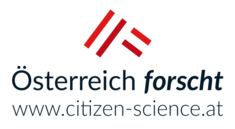Citizen Science: Österreich forscht celebrates 500th Blog Post
With the founding of the platform Österreich forscht in 2014, the initiative, which was multi-institutional and multidisciplinary from the start, pursued the goal of highlighting the diversity of citizen science opportunities in Austria, networking projects with each other and bringing science more into the center of society. Over the years, Österreich forscht has increasingly evolved from a pure information site to an interactive hub for citizen science: project filters allow users to browse the more than 50 active citizen science projects by topic, working groups allow collaborative work on specific tasks in the field of citizen science, and since 2020, researchers and co-researchers have been able to write, publish, comment on, and rate texts on the blog.
"It was important to us that a dialogue between project leaders and co-researchers is also possible on Österreich forscht," says Florian Heigl, one of the founders and coordinators of Österreich forscht. This is in keeping with the Citizen Science method, which thrives on the active participation of citizens in research.
Different blog categories invite you to browse through: you will find interviews with Citizen Scientists and project leaders, events, references to publications and much more. All these contributions can be commented on, so you can directly contact and discuss with the authors. You can follow individual categories and even individual projects or authors by subscribing to them. Then you will automatically receive a notification when a new post is published in the subscribed category. But what makes the blog so interesting?
"I read and publish posts on the Österreich forscht blog, on the one hand to share new findings from the projects with the community and to enter into scientific discourse. On the other hand, the blog is a great platform to let students and the interested public look behind the scenes of Citizen Science projects," reports Julia Lanner from the University of Natural Resources and Life Sciences, Vienna. And Alexander Lukeneder, a paleontologist at the Natural History Museum in Vienna, adds: "The films, tips and puzzles posted should whet the appetite for more and attract one or two more fossil hunters. The blog is thus used as an information and communication site that offers additional reach and opportunities for interaction. But the exchange is also important, as Sabrina Sallmanshofer from the association Icarus reports: "It is enriching to get to know projects in other scientific fields and thus also to get new ideas on how to motivate Citizen Scientists to participate."
With its blog, Österreich forscht offers a first introduction to the fascinating world of research and is ready for the next 500 contributions under the motto: You too can do research!
Österreich forscht is the online platform of the Citizen Science Network Austria (https://www.citizen-science.at/netzwerk), which is operated and coordinated by the University of Natural Resources and Life Sciences, Vienna.

